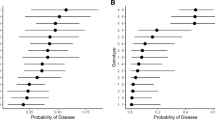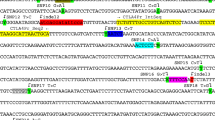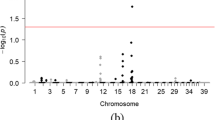Abstract
Canine hypoadrenocorticism is an endocrine disorder characterised by inadequate secretion of steroid hormones from the adrenal glands. Pathology results from immune-mediated destruction of the adrenal cortex, which is similar to that seen in the human Addison’s disease. Both the canine and human diseases have similar clinical presentation, with the diagnosis based on performing a dynamic adrenocorticotropic hormone stimulation test. MHC class II has previously been associated with the human and canine diseases. In the current study, we conducted an MHC class II association study in eight breeds of dog with diagnoses of hypoadrenocorticism. We demonstrated significant differences in dog leukocyte antigen (DLA) haplotype frequencies in six of these breeds: Cocker spaniel, Springer spaniel, Labrador, West Highland white terrier (WHWT), Bearded collie, and Standard poodle. In the Springer spaniel, the DLA-DRB1*015:01--DQA1*006:01--DQB1*023:01 haplotype was significantly associated with disease risk (p = 0.014, odds ratio (OR) = 5.14) and showed a similar trend in the Cocker spaniel. This haplotype is related to one associated with hypoadrenocorticism in the Nova Scotia duck tolling retriever. Similar haplotypes shared between breeds were demonstrated, with DLA-DRB1*001:01--DQA1*001:01--DQB1*002:01 more prevalent in both affected Labrador (p = 0.0002, OR = 3.06) and WHWT (p = 0.01, OR = 2.11). Other haplotypes that have not previously been associated with the disease were identified. The inter-breed differences in DLA haplotypes associated with susceptibility to canine hypoadrenocorticism could represent divergent aetiologies. This could have implications for clinical diagnosis and future comparative studies. Alternatively, it may suggest that the gene of interest is closely linked to the MHC.


Similar content being viewed by others
References
Barcellos LF, Oksenberg JR, Begovich AB, Martin ER, Schmidt S, Vittinghoff E, Goodin DS, Pelletier D, Lincoln RR, Bucher P, Swerdlin A, Pericak-Vance MA, Haines JL, Hauser SL (2003) HLA-DR2 dose effect on susceptibility to multiple sclerosis and influence on disease course. Am J Hum Genet 72(3):710–716
Betterle C, Volpato M, Pedini B, Chen S, Smith BR, Furmaniak J (1999) Adrenal-cortex autoantibodies and steroid-producing cells autoantibodies in patients with Addison's disease: comparison of immunofluorescence and immunoprecipitation assays. J Clin Endocrinol Metab 84(2):618–622
Blomhoff A, Lie BA, Myhre AG, Kemp EH, Weetman AP, Akselsen HE, Huseby ES, Undlien DE (2004) Polymorphisms in the cytotoxic T lymphocyte antigen-4 gene region confer susceptibility to Addison's disease. J Clin Endocrinol Metab 89(7):3474–3476
Chase K, Sargan D, Miller K, Ostrander EA, Lark KG (2006) Understanding the genetics of autoimmune disease: two loci that regulate late onset Addison's disease in Portuguese Water Dogs. Int J Immunogenet 33(3):179–184
Falorni A, Laureti S, Nikoshkov A, Picchio ML, Hallengren B, Vandewalle CL, Gorus FK, Tortoioli C, Luthman H, Brunetti P, Santeusanio F (1997) 21-hydroxylase autoantibodies in adult patients with endocrine autoimmune diseases are highly specific for Addison's disease. Belgian Diabetes Registry. Clin Exp Immunol 107(2):341–346
Famula TR, Belanger JM, Oberbauer AM (2003) Heritability and complex segregation analysis of hypoadrenocorticism in the standard poodle. J Small Anim Pract 44(1):8–12
Gambelunghe G, Falorni A, Ghaderi M, Laureti S, Tortoioli C, Santeusanio F, Brunetti P, Sanjeevi CB (1999) Microsatellite polymorphism of the MHC class I chain-related (MIC-A and MIC-B) genes marks the risk for autoimmune Addison's disease. J Clin Endocrinol Metab 84(10):3701–3707
Greer KA, Wong AK, Liu H, Famula TR, Pedersen NC, Ruhe A, Wallace M, Neff MW (2010) Necrotizing meningoencephalitis of Pug dogs associates with dog leukocyte antigen class II and resembles acute variant forms of multiple sclerosis. Tissue Antigens 76(2):110–118
Hughes AM, Bannasch DL, Kellett K, Oberbauer AM (2009) Examination of candidate genes for hypoadrenocorticism in Nova Scotia Duck Tolling Retrievers. Vet J 187:212–216
Hughes AM, Jokinen P, Bannasch DL, Lohi H, Oberbauer AM (2010) Association of a dog leukocyte antigen class II haplotype with hypoadrenocorticism in Nova Scotia Duck Tolling Retrievers. Tissue Antigens 75:684–690
Kennedy LJ, Barnes A, Ollier WE, Day MJ (2006a) Association of a common dog leucocyte antigen class II haplotype with canine primary immune-mediated haemolytic anaemia. Tissue Antigens 68(6):502–508
Kennedy LJ, Davison LJ, Barnes A, Short AD, Fretwell N, Jones CA, Lee AC, Ollier WE, Catchpole B (2006b) Identification of susceptibility and protective major histocompatibility complex haplotypes in canine diabetes mellitus. Tissue Antigens 68(6):467–476
Kennedy LJ, Huson HJ, Leonard J, Angles JM, Fox LE, Wojciechowski JW, Yuncker C, Happ GM (2006c) Association of hypothyroid disease in Doberman Pinscher dogs with a rare major histocompatibility complex DLA class II haplotype. Tissue Antigens 67(1):53–56
Kennedy LJ, O'Neill T, House A, Barnes A, Kyostila K, Innes J, Fretwell N, Day MJ, Catchpole B, Lohi H, Ollier WE (2008) Risk of anal furunculosis in German shepherd dogs is associated with the major histocompatibility complex. Tissue Antigens 71(1):51–56
Kennedy LJ, Randall DA, Knobel D, Brown JJ, Fooks AR, Argaw K, Shiferaw F, Ollier WE, Sillero-Zubiri C, Macdonald DW, Laurenson MK (2011) Major histocompatibility complex diversity in the endangered Ethiopian wolf (Canis simensis). Tissue Antigens 77(2):118–125
Klein SC, Peterson ME (2010a) Canine hypoadrenocorticism: part I. Can Vet J 51(1):63–69
Klein SC, Peterson ME (2010b) Canine hypoadrenocorticism: part II. Can Vet J 51(2):179–184
Laureti S, Vecchi L, Santeusanio F, Falorni A (1999) Is the prevalence of Addison’s disease underestimated? J Clin Endocrinol Metab 84(5):1762–1762
Lovas K, Husebye ES (2002) High prevalence and increasing incidence of Addison's disease in western Norway. Clin Endocrinol (Oxf) 56(6):787–791
Melendez L, Grew D, Turner J, Hay D, VanLiew C (1996) Concurrent hypoadrenocorticism and hypothyroidism in 10 dogs, ACVIM ABSTRACTS. J Vet Intern Med 10(3):143–195
Oberbauer AM, Benemann KS, Belanger JM, Wagner DR, Ward JH, Famula TR (2002) Inheritance of hypoadrenocorticism in bearded collies. Am J Vet Res 63(5):643–647
Skinningsrud B, Husebye ES, Pearce SH, McDonald DO, Brandal K, Wolff AB, Lovas K, Egeland T, Undlien DE (2008) Polymorphisms in CLEC16A and CIITA at 16p13 are associated with primary adrenal insufficiency. J Clin Endocrinol Metab 93(9):3310–3317
Skinningsrud B, Lie BA, Lavant E, Carlson JA, Erlich H, Akselsen HE, Gervin K, Wolff AB, Erichsen MM, Lovas K, Husebye ES, Undlien DE (2011) Multiple loci in the HLA complex are associated with Addison's disease. J Clin Endocrinol Metab 96(10):E1703–E1708
Vaidya B, Imrie H, Geatch DR, Perros P, Ball SG, Baylis PH, Carr D, Hurel SJ, James RA, Kelly WF, Kemp EH, Young ET, Weetman AP, Kendall-Taylor P, Pearce SH (2000) Association analysis of the cytotoxic T lymphocyte antigen-4 (CTLA-4) and autoimmune regulator-1 (AIRE-1) genes in sporadic autoimmune Addison's disease. J Clin Endocrinol Metab 85(2):688–691
Wilbe M, Sundberg K, Hansen IR, Strandberg E, Nachreiner RF, Hedhammar A, Kennedy LJ, Andersson G, Bjornerfeldt S (2010) Increased genetic risk or protection for canine autoimmune lymphocytic thyroiditis in Giant Schnauzers depends on DLA class II genotype. Tissue Antigens 75:712–719
Acknowledgments
We would like to thank Jo Tucker (Canine Immune Mediated Disease Awareness, CIMDA) for being instrumental in encouraging sample collection. We would also like to thank IDEXX laboratories (Harrogate, UK), Nationwide Laboratories (Poulton-le-Fylde, UK), Angela Pedder, Colleen Stead, the Bearded Collie Breed Club (UK Northern Branch), Lucy Davison, Betty Aughey, all dog owners, and clinicians for submitting samples for inclusion in the study. Acknowledgments also go to the technical staff supporting the UK DNA Archive for Companion Animals, namely Steven Quarmby, Ezinne Ibe, and Simon Rothwell. This work was supported by the European Commission FP7 project number 201167, Euradrenal.
Conflict of interest
The authors declare that they have no conflict of interest.
Author information
Authors and Affiliations
Corresponding author
Electronic supplementary material
Below is the link to the electronic supplementary material.
Online Resource 1
Haplotype counts for the six breeds with significant associations (PDF 91 kb)
Online Resource 2
Haplotype counts for the two breeds with only suggestive or no significant associations (PDF 60 kb)
Rights and permissions
About this article
Cite this article
Massey, J., Boag, A., Short, A.D. et al. MHC class II association study in eight breeds of dog with hypoadrenocorticism. Immunogenetics 65, 291–297 (2013). https://doi.org/10.1007/s00251-013-0680-2
Received:
Accepted:
Published:
Issue Date:
DOI: https://doi.org/10.1007/s00251-013-0680-2




